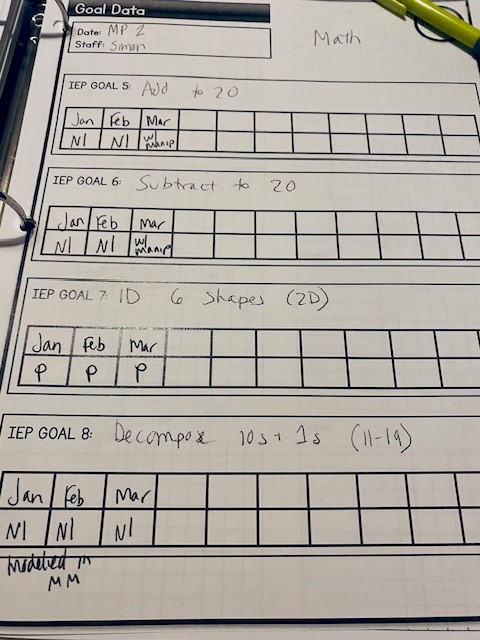
IEP meetings can be stressful to prepare for and even more stressful to execute. After reading about how to be confident in an IEP meeting, you can prepare yourself for what to say at your IEP meeting. There are a few main things I try to say in each IEP meeting that I lead. Here are 10 things to say at your next IEP meeting.
1. SIMPLIFY YOUR LANGUAGE
Some parents are not familiar with the language used in schools. Some may not even know what IEP stands for. Be mindful of the acronyms and jargon you are using when preparing your paperwork to ensure parents understand the information.

2. INTRODUCTIONS
Introducing yourself and other staff members is a great opportunity to welcome the student’s family to the team. Creating a more comfortable environment by introducing yourself and your role can start a meeting on a positive note.

3. STRENGTHS
Using the strengths page in this IEP binder can help you organize student information and gather strengths. Read more about developing a list of student strengths here.

4. PARENT AND TEACHER INPUT
Contact parents and teachers prior to the meeting to get their input in the student’s current performance. Having this information prepared ahead of time can help you know your information in the meeting. Be sure to highlight the input that parents and teachers provide about the student, as they are a vital member of the team and the student’s success.

5. DATA
Including current data is an important piece of the IEP process. These data sheets help me stay organized throughout the year and make gathering data for meetings easy! You should include district assessment data, state assessment data, and data from any previous goals.

6. NEEDS
If a new IEP is being developed, information about the student’s current needs should be included. Baseline data can be collected prior to the meeting for any new goals, to provide the team with evidence that it is an area of need.

7. SERVICES “SNAPSHOT”
Provide parents with a “snapshot” of what their child’s day looks like. Describe what interventions you provide, what the student participates in within the classroom, and what additional supports you give the student throughout the day.
8. ACCOMMODATIONS
An important part of any IEP is reviewing the accommodations that the team believes would benefit the student. Take time to discuss what accommodations should be in place to help the student be as independent and successful as possible.

9. QUESTIONS
Always leave room for questions throughout the IEP! After each section, I give parents an opportunity to ask questions or provide comments. They are an important part of the IEP process and their understanding of the content is vital.
10. PARENTAL RIGHTS
Each state has different parental rights in special education handbooks. One should be provided to parents at each IEP meeting. Additionally, I remind parents that they can call a meeting at any time. They are an important part of the team and their input is valued. Always encourage parents to ask questions and understand their rights as a parent of a child in special education.


FREE DOWNLOAD

Use this FREE preference assessment to learn about student interests to include in the IEP! This helps for a more well rounded IEP should the student ever leave you or your district. This is a free download!


